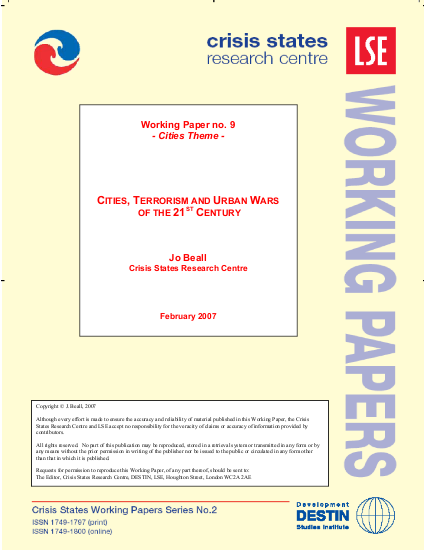
The majority of wars are fought in impoverished countries with often devastating and transformative impacts on their urban spaces. Nevertheless, the relationship between acts of terror and development is under-explored and little focus is placed on the impact on cities of the global South. In the wake of 9/11 the critical gaze has been trained firmly on terrorism in the global North, including its impact on cities: New York, Madrid, London. Defining terrorism in terms of acts of terror the paper recognises that urban centres are most susceptible to this form of political violence because of the likelihood of greater impact and visibility afforded by cities. Eschewing a ‘developing’/’developed’ dichotomy this paper nevertheless demonstrates that while terrorism has levelled risk across cities of the North and South, vulnerabilities in developing country cities are far greater. It is here that the link between terrorism and development can be most tightly drawn. It is further suggested that the incidence of urban terror is greatest in cities of less developed countries and that urban terrorism is helping define a shift from ‘peasant wars of the 20th century’ to the ‘urban wars of the 21st century’, a shift not divorced from encompassing global forces.
Resource collections
- UN Habitat - Urban Response Collection
- Urban Response - Urban Crisis Preparedness and Risk Reduction
- Urban Response Collection - Community Engagement and Social Cohesion
- Urban Response Collection - Economic Recovery
- Urban Response Collection - Environment and Climate Change
- Urban Response Collection - Housing, Land and Property
- Urban Response Collection - Urban Crisis Response, Recovery and Reconstruction
- Urban Response Collection - Urban Resilience